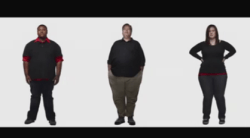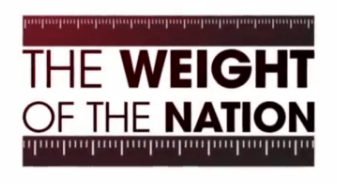Editor’s note: For another perspective on this series, see this post.
 The Weight of the Nation — a four-part mini-series that ran this week on HBO (and online) — has received a lot of attention. Produced in coordination with several federal government agencies and paired with a major national conference, the show has been heralded as “groundbreaking” and “bold.” But it’s really just the same old story.
The Weight of the Nation — a four-part mini-series that ran this week on HBO (and online) — has received a lot of attention. Produced in coordination with several federal government agencies and paired with a major national conference, the show has been heralded as “groundbreaking” and “bold.” But it’s really just the same old story.
The Weight of the Nation trailer alone smacks of tired stereotypes, but colleagues implored me to watch the entire series, so I did. And it was even worse than I feared.
I’m all in favor of bringing more attention to the nation’s diet-related health crisis. But the HBO series distracts us with the usual scare tactics, dances around the hard political issues, and leaves the viewer with the misguided impression that if we all just worked harder in our own communities, we could fix this mess.

A still from Weight of the Nation.
Fear the fat — more shaming and blaming
Many others have provided excellent explanations for why all the alarm-sounding over obesity should be questioned from a scientific perspective. For example, see Deb Burgard’s and Linda Bacon’s responses to the series, which both stem from the Health at Every Size movement, and aim to shift away from size and fat-shaming toward health and compassion.
Marilyn Wann also gives a historical overview and critique of the series and disputes the Centers for Disease Control and Prevention’s claim that Weight of the Nation is “an unprecedented public health campaign.”
But even without getting into a debate over data, there’s clear evidence — in the form of scientific research — that many people exhibit “obesity bias.” In other words, fat people have enough problems dealing with discrimination, bullying, and stigma, and shows like this make life even more difficult for them.
Indeed, the first two episodes were all about the sad people suffering from one malady or another, interspersed with health-expert talking heads scaring us with statistics and images of organs and surgeries. There was not a peep about thin people’s risk for many of the same diet-related chronic diseases.
What The Weight of the Nation got right
The third segment, which focuses on children, did finally address junk food marketing, with excellent quotes from folks like Kelly Brownell of the Rudd Center on Obesity and Food Policy (he calls such marketing “powerful, pernicious, and predatory”), and Margo Wootan of the Center for Science in the Public Interest. “Marketing shapes kids’ choices, to foods that will kill them,” Wootan told the filmmakers. This segment also included good footage of a congressional hearing on the marketing of processed food, the only foray into actual policymaking in the entire program.
Also helpful were segments on agricultural policies and the way our bodies are hardwired to conserve fat. These were a clear attempt to shift the conversation away from personal responsibility. However, none of these discussions dove deeply enough into the politics. Overall, the show’s messages stayed safely in the realms of medicine, exercise, behavior change, and localized solutions.
Missed opportunities
The Weight of the Nation includes numerous examples of soda and junk food marketing to children, but spends far too little time on the powerful lobbying by the food, advertising, and media industries that undermine policymaking. And it’s not like such information isn’t readily available.
During a segment showing Philadelphia Mayor Michael Nutter (D) wandering the streets of his city in search of healthy food, I thought: This would be a great time to talk about how the American Beverage Association lobbied to stop his soda tax proposal. (The group even donated $10 million to Philadelphia’s Children’s Hospital to ensure his silence.) But no, not a chance.
On a similar note, many of the experts on the show identified soft drinks as enemy No. 1. But none of the many scenes with New York City’s Health Commissioner Tom Farley mentioned that city’s attempt to restrict food stamp spending on soft drinks — another attempt at policy change that got heavy push-back from the soda industry.
I was hopeful during one segment when the talking heads admitted that exercise and physical activity were really far less important than food intake when it comes to addressing obesity, a point I’ve made related to children. (Kudos for the experts’ takedown of the awful show The Biggest Loser.)
But despite this, far too much emphasis was placed on exercise throughout the program and the only tangible policy ideas were for things like walking and bike paths.
Where are the policy solutions?
In fact, most disappointing was how the program offered no clear policy solutions. And not a single lawyer appeared to discuss litigation as a strategy to hold the food industry accountable. And what about the farm bill, which is up for renewal this year?
Nope, that’s all too edgy — even for HBO.
Of course, the entire project was produced in collaboration with the federal Department of Health and Human Services, which isn’t exactly going to criticize the Obama administration for its failure to lead on numerous food issues. Also featured prominently was the congressional advisory body, the Institute of Medicine, which released a set of recommendations last week that are remarkably similar to those released seven years ago.
Obesity distracts from food system change
Continuing to focus on obesity is problematic for numerous reasons. As this program painfully demonstrates, it’s too easy to place the blame on individuals as the locus of change. Add to that how the food industry uses obesity as an excuse to market healthier foods (while they help fund playgrounds and exercise programs) and you have a smokescreen behind which the real issues are often obscured.
Instead of focusing on body size, let’s garner the political power we need to fix the food system. This approach is admittedly much more complex than calories in/calories out, but it’s also more compassionate. As Deb Burgard explains, the blame game is just too easy:
Blaming fatness keeps us from addressing the root causes of our problems and is clearly unfair to fat people. Many powerful people understand this but find it expedient to frame a problem in terms of fat in order to bring attention to it. They don’t think people will attend to the real issue unless they whip up the fat panic … I say, have the courage to make your argument about the real issues and stop doing it on the backs of fat people.
Doing so will take a concerted political movement — one that can’t be brought to you by cable television.


